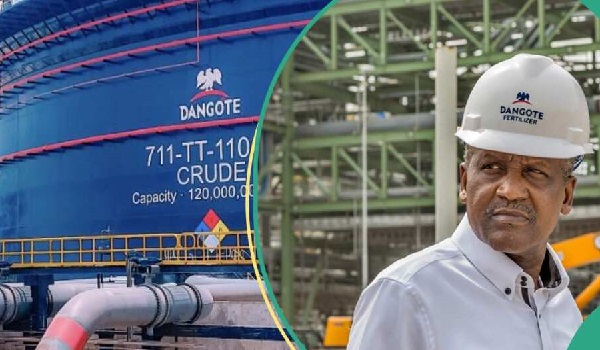Dangote has offered to sell his multibillion-dollar oil refinery to NNPCL.
NewsOnline Nigeria reports that Africa’s wealthiest man, Aliko Dangote, has announced his willingness to sell his multibillion-dollar oil refinery to the state-owned energy company, NNPC Limited.
This decision comes amid escalating disputes with regulatory authorities and equity partners, sparking a reflection on his investment choices in Nigeria.
Dangote, who spoke in an interview with Premium Times on Sunday, said he is currently considering selling the 650,000 barrel-per-day refinery to the national oil company, NNPC, as he is now being labeled a monopolist.
Dangote’s 650,000 barrel-per-day refinery, which became operational last year after a decade-long construction period, cost $19 billion—more than double the initial estimate. It was envisioned to reduce Nigeria’s reliance on imported fuel and save up to 30% of the country’s foreign exchange spent on imports. However, the project has faced significant challenges, including supply chain issues and regulatory disputes.
Dangote mentioned his willingness to transfer ownership of his multibillion-dollar oil refinery to the state-owned NNPC Limited. He said the new dispute with a key equity partner in the oil and gas industry, particularly the regulatory authorities, is part of an attempt to frustrate the refinery from coming into operation.
Dangote states that despite Nigeria’s long-standing fuel crisis and the $19 billion refinery’s potential to resolve it, there are vested interests unhappy with the project who are willing to undermine its success. He urged the state-owned oil company to buy him out, suggesting that this might dispel accusations of him being a monopoly.
“Let them (NNPCL) buy me out and run the refinery the best way they can. They have labelled me a monopolist. That’s an incorrect and unfair allegation, but it’s OK. If they buy me out, at least, their so-called monopolist would be out of the way,” Dangote told PREMIUM TIMES in an exclusive interview.
The refinery, set for its first roll-out of petrol in August, has been operating at just above half capacity due to difficulties in sourcing crude oil from international producers.
These companies either demand exorbitant premiums or claim unavailability of the product. NNPC, a key supplier, had delivered only 6.9 million barrels of oil to the plant by May, far less than required. This shortfall has forced the refinery to look to countries like Brazil and the US for supplies.
Despite his commitment to Nigeria, Dangote admitted that the obstacles faced by his refinery have led him to reconsider his investment strategy.
“Four years ago, one of my very wealthy friends began to invest his money abroad. I disagreed with him and urged him to rethink his actions in the interest of his country. He blamed his action on policy inconsistencies and shenanigans of interest groups. That friend has been taunting me in the past few days, saying he warned me and that he has been proven right.”
Reliable sources with knowledge of the conversation suggest to Nairametrics that the friend Dangote is referring to is another business tycoon, Femi Otedola. The maverick billionaire is thought to live mostly abroad and has diversified business outside the country and in Nigeria.
According to another source close to Dangote, Africa’s richest man believes if he had invested $19 billion in stocks like Tesla, Microsoft, Citibank, and Amazon, he could have made over $86 billion.
Adding to the refinery’s woes, Devakumar Edwin, Vice President of Oil and Gas at Dangote Group, recently accused the Nigerian Midstream and Downstream Petroleum Regulatory Authority (NMDPRA) of allowing marketers to import substandard fuel.
Farouk Ahmed, Chief of the NMDPRA, countered that diesel from Dangote’s plant contained high levels of sulphur, harmful to engines and the environment.
In response, Dangote invited members of the House of Representatives to tour the refinery and witness lab tests comparing the sulphur content of its diesel with imported samples.
The tests revealed that Dangote’s diesel had a sulphur content of 87.6 ppm, significantly lower than the imported samples, which had levels exceeding 1800 ppm and 2000 ppm.
Dangote, reflecting on his situation, noted, “As you probably know, I am 67 years old. In less than three years, I will be 70. I need very little to live the rest of my life. I can’t take the refinery or any other property or asset to my grave. Everything I do is in the interest of my country.”
Despite his patriotic intentions, Dangote’s recent experiences have led him to announce plans to halt his investment in Nigeria’s steel industry to avoid accusations of monopolistic practices. “About doing a new business which we announced, that is steel.
Actually, our board has decided that we shouldn’t do the steel because if we do the steel business, we will be called all sorts of names like Monopoly. And then also, imports will be encouraged,” he said.
The saga surrounding Dangote’s refinery highlights the complexities and challenges of large-scale investments in Nigeria.
Despite his intentions, the billionaire’s experiences serve as a cautionary tale for other investors, underscoring the importance of a stable and supportive regulatory environment.

